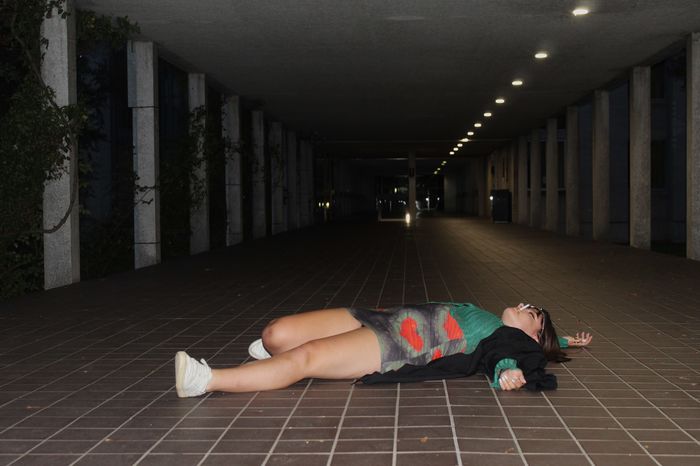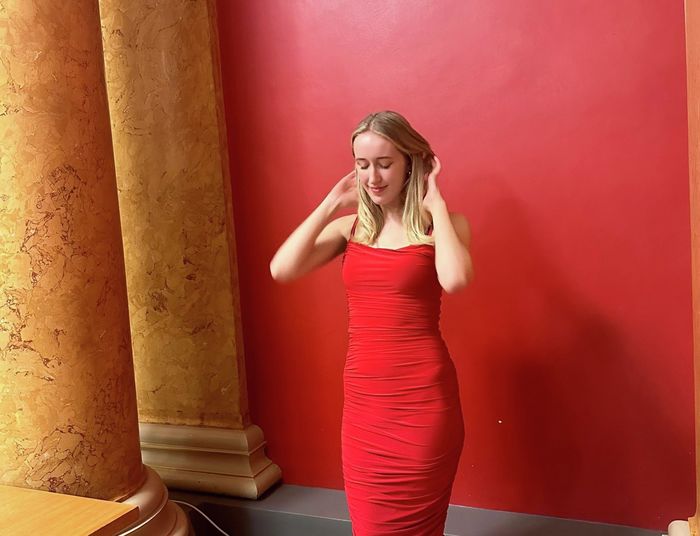‘Buy Less, Buy Better’: Jane Horwood on Circular Fashion in Cambridge
The founder of vintage boutique TrashChic on how to reuse and reinvent clothes

Jane Horwood, founder of the pre-loved clothing boutique TrashChic, doesn’t really go for the mainstream. With her bright pink glasses and graphic denim jacket, this web-designer-turned-fashionista has built a business out of her eye for unusual and eccentric pieces. “I like bright colours,” she tells me, “clothes that have an interesting story”. Perhaps this is why TrashChic sells things you wouldn’t fin on the highstreet. In contrast to what she dismisses as the “samey” seasonal lines that big brands produce, the sequins, polka dots and animal prints of Jane’s collection give off a sense of timeless eccentricity. People buy her clothes, Jane thinks, “when they want something fun, something different.” They’re the kind of clothes that you notice – whether you like them or not.
“I like bright colours,” she tells me, “clothes that have an interesting story”
TrashChic is a microbusiness without regular employees or a storefront. The shop’s day-to-day operations consist of sourcing, sorting through and selling pieces, either online or at a steady stream of markets and carboot sales in the Cambridgeshire area. In a world where most of our clothes are part of supply chains that cross continents, there’s something refreshing about the locality of this boutique, which according to Jane is yet to venture beyond Ipswich. Within the creativity and artful eclecticism of the TrashChic, there lies a genuine attempt to try and enact change in the fashion industry. Jane articulates her concerns about the dark underside of modern consumption, reminding me that “when you buy a £5 dress at Zara or H&M, someone is paying for that. It might not be you or me, but someone down the line is.” Her passion for secondhand clothing is inspired by the belief that fashion is not for immediate, short term gratification, but something that can be reused, recycled and reinvented throughout its lifetime.

In recent years, secondhand clothing sellers have enjoyed unprecedented prominence in the UK market. Often cheaper, more original, and environmentally conscious, businesses like TrashChic have a lot to offer the consumer. Nevertheless, Jane emphasises that running a small business in an industry dominated by brands worth hundreds of millions isn’t straightforward. The regular slog of meeting customers at small, local events is not always profitable and can make it difficult to, as Jane says, “find your people.” Small businesses can’t cut costs the way that international conglomerates can and developing a social media presence in a saturated market can feel near impossible. There’s an ethical question that business owners like Jane who are interested in reducing consumption must confront. How does one encourage a “buy less, buy better ethos”, when business rewards those who sell the most? “I don’t want people not to buy things,” Jane remarks, “because that’s what I’m doing, I’m selling clothes.”
“I don’t want people not to buy things,″ Jane remarks, “because that’s what I’m doing, I’m selling clothes”
TrashChic will be featured at the Grand Arcade’s upcoming circular pop up event running 28th and 29th of October. This event is part of a week of “Let’s go circular” events run by the shopping centre to encourage and showcase more sustainable modes of consumption. According to one of the organisers, the purpose of the concept is to “connect and share knowledge” about how to cut pollution and waste out of production. Jane says that this sort of event marks a rare opportunity for businesses like TrashChic to reach a more mainstream consumer audience. Regular costs for a retail unit in a shopping centre are untenable for most independent businesses, with rent usually surpassing £2,000 a week.
The exploitative and unsustainable practices of the fashion industry have increasingly come to light in recent years. Large scale change can seem slow, the challenges insurmountable. My conversation with Jane left an impression of the creative fervour and commitment that allows businesses like hers to breathe new life into old items. The fashion industry undoubtedly has a lot to answer for, but maybe there is a lot to be learnt from small businesses that think big.

 Comment / Cambridge’s tourism risks commodifying students18 April 2025
Comment / Cambridge’s tourism risks commodifying students18 April 2025 News / Cambridge student numbers fall amid nationwide decline14 April 2025
News / Cambridge student numbers fall amid nationwide decline14 April 2025 News / Greenwich House occupiers miss deadline to respond to University legal action15 April 2025
News / Greenwich House occupiers miss deadline to respond to University legal action15 April 2025 Comment / The Cambridge workload prioritises quantity over quality 16 April 2025
Comment / The Cambridge workload prioritises quantity over quality 16 April 2025 News / Varsity ChatGPT survey17 April 2025
News / Varsity ChatGPT survey17 April 2025







